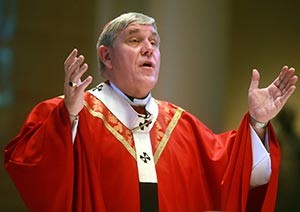For at least two people who have read Pope Francis’ 264-page apostolic exhortation “The Joy of Love,” a key word is “reflection.”

Archbishop Jerome E. Listecki (Catholic Herald file photo)
“The pope is saying the joy of the church is found in marriage and family life. Strong marriages, strong families produce tremendously devoted and committed individuals to the church and serve the church in various ways,
“Archbishop Jerome E. Listecki told the Catholic Herald. “But you also have to take a look at what he’s doing. He’s asking people to reflect on marriage and family. That’s really key.”
The archbishop noted when readers of the document “cherry pick – go to their pet topic,” they miss the pope’s invitation for reflection.
“That’s why, right away, in the beginning the pope says when you read this, it is really meant for reflection – what you’re doing, what it means to be married, what it means to be family. He wisely does that and a pastor does that,” the archbishop said.
Ulrich L. Lehner, professor of theology at Marquette University, described the document as “very practical” and as a “how-to-do book” which warrants that reflection.
“I encourage couples to read a paragraph a day together,” he told the Catholic Herald.
Lehner’s favorite chapter, he said, is titled “Love in Marriage,” much of which is devoted to St. Paul’s teaching on love – 1 Cor 13:2-3, often read at wedding Masses.
“I hope this (chapter) is widely read – starting in marriage preparation,” he said. “It defends ‘Humanae Vitae’ (Pope Paul VI’s encyclical “On Human Life”); it defends the consistent ethic of life. It teaches why we hold on to these teachings.”
The next time Lehner teaches “Introduction to Theology” to undergraduates at Marquette, his students may find “The Joy of Love” as one of the course’s required texts.
“This talks about love as a reality; it is not a sentimentalist piece,” he said.
Archbishop Listecki said the chapter titled “Accompanying, Discerning and Integrating Weakness,” was important, but noted the “most controversial part is when the pope talks about the pastoral response.”
“He goes back to a favorite phrase of his – field hospital, where we treat the wounded who are suffering,” the archbishop said. “That’s a great image for the church on the move; a pilgrim church on the move is in need of a field hospital. He talks about those who, for whatever reason, are not able to embrace a marriage that was supported by the church.”
In an August 2013 with America magazine, Pope Francis told the interviewer, “I see the church as a field hospital after battle. It is useless to ask a seriously injured person if he has high cholesterol and about the level of his blood sugars! You have to heal his wounds. Then we can talk about everything else. Heal the wounds, heal the wounds…. And you have to start from the ground up.”
The controversy to which Archbishop Listecki referred might be found throughout the chapter as the pope suggests how priests should reach out to those who, for example, are divorced and remarried without having had the previous marriage annulled, which keeps them from receiving the Eucharist.
Pope Francis writes: “… a pastor cannot feel that it is enough to simply apply moral laws to those living in ‘irregular’ situations, as if they were stones to throw at people’s lives. This would bespeak the closed heart of one used to hiding behind the church’s teachings, ‘sitting on the chair of Moses and judging at times with superiority and superficiality difficult cases and wounded families.’” (305)
The archbishop noted people will “see a broad spectrum of the possibilities in the pastoral approach.”
“What Francis does is he leaves it up to the individual bishop or archbishop to articulate positions and matters and ways in which this outreach to those who find themselves estranged from the church can in some way experience a greater relationship to church,” Archbishop Listecki said.
Asked if anything about the document surprised him, the Archbishop Listecki said “the pastoral tone, but then that shouldn’t have surprised me.”
“The pastoral tone really carries out Francis’ desire to be pastor to the church and to extend that pastoral approach through the lives of the various bishops that head the dioceses and archdioceses in the world,” he said, adding, “You have a pastor (Pope Francis) who is helping people, through his reflection, understand the mystery of marriage and family. And, as a good pastor, he is also alerting us to the problems that occur in marriage.”
